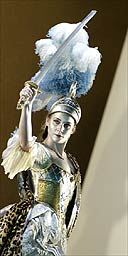
Photo: Tristram Kenton Photograph: Tristram Kenton/Guardian
A new season at Glyndebourne begins with a new administration - executive chairman, general director and music director - firmly in place, and some fresh faces in the production roster too. The first production there of Iphigénie en Aulide signals the UK debut of the German director Christof Loy. His name will become far more familiar in the next few years - he is scheduled for several new shows at Covent Garden.
If this Iphigénie is an accurate guide to Loy's approach, then we can expect more striking stage pictures, interspersed with moments of teasing bafflement. In Herbert Murauer's elegant black-and-white set, Loy presents a reading of Gluck's tragedy that is always faultlessly arrayed on the stage and seems to inhabit several epochs interchangeably.
The men's wigs, which look like a job lot acquired from the Meatloaf Appreciation Society, may be troublingly unrevealing, but the dark suits and pastel day dresses of Bettina Walter's costumes fix the first and third acts in the present day.The ballgowns and shiny armour of the second act, meanwhile, hark back to the 18th century. Yet some characters, such as Agamemnon, remain fixed in the present day, even while the back wall rises to reveal an ornate classical tableau, when the goddess Diane (Marie Arnet) arrives to spare Iphigénie from sacrifice.
In Loy's reading, even this divine intervention does not guarantee a happy ending. Agamemnon and his family are a dysfunctional bunch: he and his wife Clitemnestre hardly exchange a glance, and during the final chorus the king kills his daughter. At least his ruthlessness is clear-cut, as is the chilling determination of his high priest Calchas, (Clive Bayley), who urges Iphigénia's destruction.
Other strands are psychologically more ambiguous. Most characters act with total naturalism - the relationship between Veronica Cangemi's deceptively tough Iphigénie and Jonas Degerfeldt's Achille has perfectly conventional body language - but Gerald Finley's nobly sung Agamemnon and Katarina Karnéus's Clitemnestre are couched in stylised histrionics, as if distinct worlds of expression were mingling on stage.
There can be no ambiguity about the high musical quality of the performances, all superbly supported by Ivor Bolton's conducting, and of the playing of the Orchestra of the Age of Enlightenment.
Until July 5. Box office: 01273 813813.

